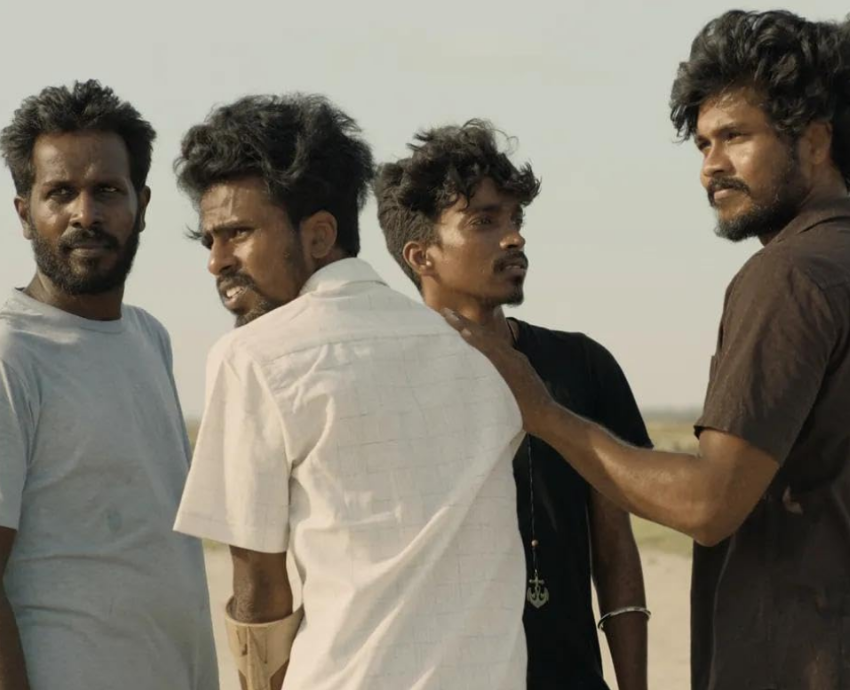
Sand (Munnel)
Directed by Visakesa Chandrasekaram
2023, Sri Lanka, 101 minutes
The opening scene of Sand features a close-up shot of a bare-bodied, injured young man, with a sarong wrapped around his waist. The man is in deep physical pain, desperately crawling in the sand. The camera, just inches away, moves along his body, revealing a wounded leg. Then we see a young boy appear above him, offering a small capsule attached to a necklace. The boy is carrying a few of these necklaces, as if a street hawker selling trinkets. Once his offer is refused by the injured young man, who is intent on living, the boy moves on to another body, a blurred figure in the background, a few metres away.
For an audience familiar with the Sri Lankan anti-Tamil war, the necklace carries the infamous cyanide capsule worn by the Tamil Tigers — the Liberation Tigers of Tamil Eelam (LTTE) — during the 30-year brutal war. The scene's location is Mullivaikkal beach, a north-eastern coastal area, where the final atrocity took place in May 2009, when more than 40,000 civilians were killed by the Sri Lankan security forces after “evacuating” them from their homes into a so-called “no-fire zone”.
Sand (Munnel in Tamil) is directed by Visakesa Chandrasekaram, and screened at the Sydney Film Festival. It is an insightful film about the Tamil community in the northern province of Sri Lanka, still enduring post-war violence and destitution. This is a key Tamil film, which includes English and Sinhala dialogue, reflective of the multi-lingual context in Sri Lanka.
The film follows the story of a young former rebel fighter, five years after the war. He is struggling with the rehabilitation of his injured leg, the state legal proceedings against former rebels, unemployment and poverty. His main care-giver is his mother, who runs a small sooth-saying business with a few clients, mostly women from the local community. The mother and son occupy an abandoned house, as their own home is in a restricted area under military control.
The story is minimalist in style with well-crafted scenes that draw the audience into the lives of the main characters as they try to negotiate a range of emotions and oppressive situations. The harassment at military checkpoints, the alienation of the legal process, the minimal access to physical rehabilitation, the lack of access to counselling or mental health services and the lack of meaningful jobs or opportunities for social contribution are just some of the themes. The enduring trauma of violence and torture lingers. This is juxtaposed with the alienation from mainstream Tamil party politics, along with the reassertion of caste divisions, where religiosity and supernatural beliefs offer the only means of escape from a heartless context and a soulless condition.
This is a powerful movie, particularly, at a time when there is a crisis in representative party politics in Sri Lanka. The dominant political parties continue to evade a range of post-war reconstruction issues that directly relate to Tamil and Muslim communities in the North and East. Some of the key issues include: ending military colonisation, local regional autonomy, justice and reparations for those disappeared, release of political prisoners, access to state social services and economic opportunities.
The commemoration of those who died in the Mullivaikkal massacre is suppressed by the government as well as the mainstream media. Even within the popular struggle in 2022, when some activists of the uprising suggested a commemoration event, this was refused by some Sinhala war veterans with disabilities and Buddhist monks, who were also activists. Nevertheless, a small event was conducted with the lighting of a ceremonial lamp. In May, when a few activists, including Sand's director Chandrasekaram, held a modest commemoration event in Colombo, it was disrupted by a group of Sinhala-Buddhist ethno-nationalists, with the support of security forces.
The filming was done in the North, during the popular uprising in the South of the island. Most of the cast and crew members were from the Tamil-speaking North and East, and some were war survivors. The movie won the Special Jury Award at the 2023 International Film Festival in Rotterdam. Visakesa is a human rights lawyer and a senior lecturer at Colombo University. He was an active participant, along with a range of other artists, in the popular uprising last year. He is also a key activist within the queer movement in Sri Lanka.
The second screening of the film at the Sydney Film Festival was dedicated to Nathasha Edirisooriya, a female comedian who was detained on May 27, for “defaming” Buddhism. She is one of the few Sinhala female comedians brave enough to openly discuss issues of sexual harassment, sexual violence and the lack of proper sex education in schools. The layered storytelling in this movie with its delicate treatment of some complex and controversial topics is integral to re-imagining justice in Sri Lanka.
According to Visakesa, “Film (and other forms of arts) is an instrument of social action for me, rather than a simple art form; hence I only choose stories which could ignite a discussion or debate and enlighten the people to take a progressive path towards full democracy which is manifested in equality, justice and human rights.”